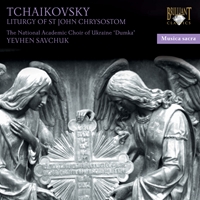"I attend Mass frequently. The liturgy of St John Chrysostom is one of the most exalted works of art. Anyone following the liturgy of the Greek Orthodox service attentively trying to comprehend the meaning of each ceremony will be stirred to the very depth of his being. I am also very fond of evening prayers. There is nothing like entering an ancient church on a Saturday, standing in the semi-darkness with the scent of incense wafting through the air, lost in deep contemplation to find an answer to those perennial questions: wherefore, when, whither and why?" These are the words of Tchaikovsky writing to his patron Nadezhda von Meck (who he never met), and he continued, ‘As you can see, I am still bound to the Church by strong ties, but on the other hand I have long ceased to believe in the dogma … this constant inner struggle would be enough to drive me out of my mind were it not for music, that great comforter, the most exquisite gift Heaven has bestowed on a mankind living in darkness.’
Like Rachmaninoff a few years later, Tchaikovsky had ceased to be a true believer, but he was still drawn to the Church, and was deeply moved by the music of the Orthodox Church. In his case, the conflict between the Church and his homosexuality must have added to his spiritual turmoil. However, he produced some of his most personal and moving music in this setting of the liturgy of the fourth century Patriarch of Constantinople, St John Chrysostom. Although the work met with a mixed response upon its premiere in 1880, this usually ultra-sensitive and self-critical composer was not unduly concerned by the criticism. He knew he had produced a masterpiece, and commented that the performance was one of the happiest moments of his life.
Further information
- Recorded in 2001.
- Sung texts can be found on
www.orthodoxliturgicaltext.com.
